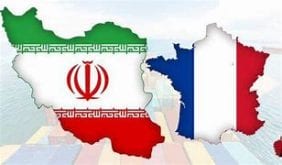newarab – On Saturday, 29 July, a group of exiled Iranians staged a protest outside the International Neuroscience Institute (INI) in Hanover, Germany, over the alleged admission of Hussain Ali Nayeri, a notorious Iranian “hanging judge”.
Despite INI officials denying Nayeri “now being” in this health centre, the demonstrators demanded his arrest and trial and a response from the German authorities about his purported presence in Germany.
The news of Nayeri’s stay at INI emerged on 23 July through a report by the German outlet Press Portal, which claimed that on 27 June, Nayeri had been admitted to INI. The unfolding situation sparked debates about the necessity of thorough investigations and accountability.
The report said that on 7 July, Volker Beck, President of the German-Israeli Society, notified the relevant German authorities, including the Federal Public Prosecutor, the LKA Lower Saxony, the Foreign Office, and the Federal Ministry of the Interior, about Nayeri’s possible whereabouts, urging them to take appropriate legal action.
While the German authorities have remained silent, Iranian activists in Germany assert that Nayeri obtained a Schengen visa from Italy before travelling to Hanover for medical treatment.
Western countries’ double standard
An Iranian analyst, Mehdi Abadi, who currently resides in Exile in the UK, told The New Arab that there had been a remarkable shift in the Western powers’ stance towards Iran in recent months, with a notable adoption of a more conciliatory approach.
“During last year’s uprising in Iran, Western countries were outstandingly direct in their condemnation of Iranian officials and in expressing solidarity with the protestors,” he remarked, referring to the protests that endured for over four months, resulting in over 500 dead.
“But following the Iranian authorities’ brutal suppressing of the protests, the Western nations have reverted to employing their strategy of pragmatic diplomacy when dealing with authoritarian regimes worldwide,” he added.
Meanwhile, the news of the presence of the clergy who served as a critical judge in the “death commission” responsible for the execution of thousands of leftist prisoners severely shocked the Iranian diaspora and activists in Germany.
Shaghayegh Tolouei Nayeri, a 28-year-old law student in Kiel whose family fled Iran when she was nine, explained to TNA her anger over the authorities’ lack of response to the case.
“Ordinary citizens and those seeking a humanitarian visa from Europe to flee Iran’s religious dictatorship are denied such visas, while a criminal and mass-killer can easily exploit the democratic mechanisms within the European Union to travel between its countries without a visa,” said Tolouei Nayeri, who is not related to Judge Nayeri.
This activist, eagerly engaged in last year’s anti-Iranian establishment demonstrations in Germany, pointed out Nayeri’s active role in the infamous “death commission” established by Iran’s first supreme leader, Ruhollah Khomeini, to execute leftist prisoners in 1988.
“Germany, as a signatory of the International Criminal Law, bears the responsibility of bringing to justice those who have committed crimes against humanity in any other country,” she added.
She also highlighted the concerns over the apparent lack of action by Verfassungsschutz, the German office for the protection of the constitution, both in its prior knowledge of Nayyeri’s entry and stay in Germany and its failure to take action upon becoming aware.
“Nayeri’s travel to Germany means that the German officials had no knowledge that a person who had committed crimes against humanity had freely entered the country, or they knew it but did nothing. Either way, this shows they failed to fulfil their responsibility,” she stressed.
Judge Nayeri has been known among high-ranking Iranian officials for openly defending the mass executions in 1988. In an interview last year, he justified the actions: “The country was in a crisis … what could we do in such crisis but to hand down decisive orders? Those officials in the courts were responsible for solving the problem.”RELATED
Controversy over German clinic
This was not the first instance of an Iranian judicial official with a controversial human rights record receiving treatment at the INI clinic. In 2018, Ayatollah Mahmoud Hashemi Shahroudi, a former chief justice and another member of the 1988 “death commission,” was also admitted to INI.
This private health centre’s director, Professor Madjid Samii, maintains close ties with high-ranking Iranians, and sources said that he was one of the primary doctors treating Iran’s Supreme Leader Ayatollah Ali Khamenei after he survived an assassination attempt in 1981.
In recent days, photos went viral on social media showing Samii with prominent Iranian figures, including the late Ali Akbar Hashemi Rafsanjani, one of the founders of the Islamic Republic in Iran, former president Hassan Ruhani, and Mohammad Bagher Ghalibaf, a former top IRGC commander who now serves as the conservative parliament speaker.
Responding to criticisms, INI director Samii said he would treat any patient, even Vladimir Putin, the Russian President.
This response further fueled controversy among Iranians, with Ayoub Bdollahi, who lost an eye during last year’s anti-establishment protests in Iran, comparing Samii to the doctors and scientists collaborating with Nazi Germany during World War II.
“Your attitude has proven that possessing scientific knowledge does not necessarily make one humane, just like the Nazi scientists who served the oppressors,” Bdollahi remarked in a video addressing the situation.
 Shabtabnews In this dark night, I have lost my way – Arise from a corner, oh you the star of guidance.
Shabtabnews In this dark night, I have lost my way – Arise from a corner, oh you the star of guidance.



